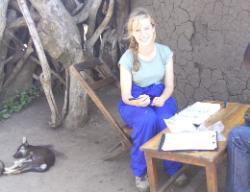Rachel Hopper
Title: Tracking tsetse and trypanosomes: analysis of the transmission of trypanosomes between tsetse and their wild and domestic hosts
About Rachel: I am a second year PhD student based at the Liverpool School of Tropical Medicine working on human African trypanosomiasis. My current research aims to examine the relationship between tsetse and their environment, as well as their interaction with wild and domestic hosts on the edges of wilderness areas. I initially studied Biomedical Science at Lancaster University where I also spent a year training in the Pathology department at Blackpool Hospital. Following this I completed a Masters at LSTM in the Biology and Control of Parasites and Disease Vectors. As part of my MSc I undertook a project researching the movement and distribution of tsetse populations in Zimbabwe through the use of population genetics.
During the first year of my PhD I have spent almost six months in the Serengeti district, Tanzania, collecting data to better understand the ecology of tsetse and sampling cattle to quantify insecticide use in this area. I’ve developed coding and statistical skills through the use of R to analyse my ecological data, gained more laboratory experience whilst optimising the insecticide detection method, and attempted to learn as much Swahili as possible!
I’m enjoying being part of the ZELS-AS cohort as we are able to increase our knowledge about other diseases outside of our own research, which may also be impacting the same communities we work with in our host countries. I’ve also learnt about the different approaches taken by several of the students such as the methods employed in the social science field which I was previously unfamiliar.
About the Project: This PhD studentship will be linked with the project investigating human African trypanosomiasis (sleeping sickness) in the Serengeti ecosystem of Tanzania (Co-PIs: Profs. Steve Torr, Liverpool School of Tropical Medicine; Dr. Liam Morrison, Roslin Institute; Dr Harriet Auty, Scotland’s Rural College; Prof. John Hargrove, University of Stellenbosch, South Africa; Dr Furaha Mramba, Tsetse and Trypanosomiasis Research Institute, Tanzania).
The inter-disciplinary supervisory team will be drawn from researchers in the ZELS consortium with expertise in parasitology, epidemiology, vector biology and mathematical modelling. This PhD will use various molecular methods to analyse the transmission dynamics of trypanosomes in wild populations of tsetse, livestock and hosts and laboratory-based studies of factors that are likely to affect transmission between tsetse and mammalian hosts. Studies will also be extended to include analyses of the population genetics of tsetse and Trypanosoma species to quantify sub-structuring of parasites related to geography, vector- and host-species. The student will gain experience of molecular techniques, entomology, parasitology and bioinformatics from Roslin and LSTM, as well as extensive experience of field work in Tanzania. Data generated by the PhD will improve estimation of key parameters involved in trypanosome transmission and hence make an important contribution to the development and application of epidemiological models of trypanosomiasis.
Outline: In sub-Saharan Africa, tsetse flies transmit trypanosomes which cause sleeping sickness in humans (Human African Trypanosomiasis, HAT) and animal trypanosomiasis in livestock. In East Africa, sleeping sickness is a zoonosis associated with wilderness area, with wild and domestic animals playing an important role as reservoir hosts. Our project is analysing the transmission dynamics of sleeping sickness associated with the Serengeti National Park of Tanzania and developing epidemiological models to guide interventions against the disease.
Important parameters in models of sleeping sickness include the duration of patent infection in vectors and hosts, and the probabilities that trypanosomes transfer between hosts and vectors when when a fly bites. Values for these parameters are based on surprisingly few empirical studies conducted largely before the advent of molecular tools.
The project will be based at the Liverpool School of Tropical Medicine, but will involve substantial periods of time spent in Tanzania. The student will gain experience of molecular techniques, entomology, parasitology and bioinformatics from Roslin and LSTM, as well as extensive experience of field work in Tanzania. Data generated by the PhD will improve estimation of key parameters involved in trypanosome transmission and hence make an important contribution to the development and application of epidemiological models of trypanosomiasis.
Supervisors: Prof. Steve Torr ( LSTM) 2nd Supervisor: Prof. Liam Morrison (Roslin).

